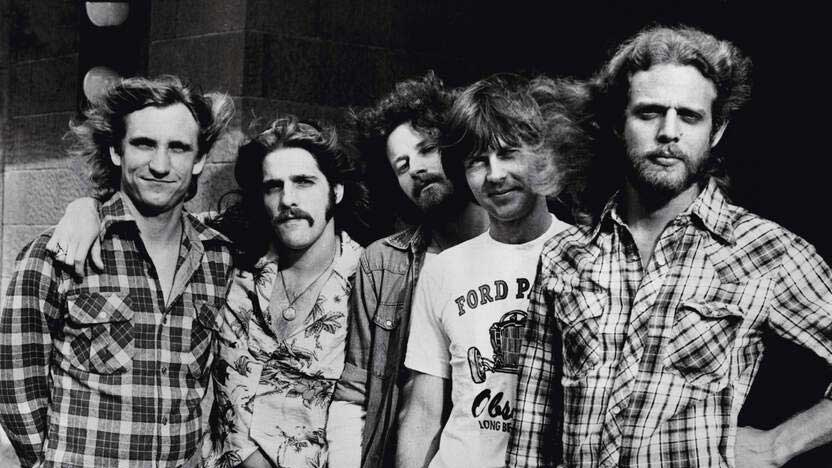
By the summer of 1976, when the Eagles were making their Hotel California album, they were already so far over the rainbow they were shitting pots of gold. When co-founding member and country music missionary Bernie Leadon stormed off, taking his banjo with him after yet another clash over the band’s “direction”, the Eagles stopped masquerading as wholesome weed-and-wine minstrels from Laurel Canyon. They were now playing what singer/guitarist Glenn Frey called “satanic country rock”.
Frey, a James Dean-worshipping Motown devotee from Detroit, had arrived in LA in 1969 playing Chuck Berry covers. For Frey, as with his co-songwriting compadre Don Henley, a lantern-jawed Texan not much taken with fucking around, the country thing was merely a ticket to ride; just what happened to be happening where the Eagles hatched. If they had formed in London instead of LA, they would have been a glam-rock band, no beards or double denim allowed.
Indeed, Frey might have been more comfortable – musically, a least – in a glam-rock band. He liked to throw cigarettes into the air and catch them in his mouth – a trick he stole from James Dean. He drew “parallels between rock’n’roll and being an outlaw”, adding: “I feel like I’m breaking a law all the time.”
Similarly, Henley was less concerned with country music as he was with fame and fortune. He liked soul music, and appreciated country, but that wasn’t what fuelled the success of the Eagles. It was the sheer force of personality of Frey and Henley. Glenn and Don. And their desire to be considered in the same 70s category as giants the Rolling Stones and Led Zeppelin.
All of which would be evoked on Life In The Fast Lane, the track the Eagles built around a powerful boogie riff from Leadon’s replacement, Joe Walsh. Goodbye folksy banjos and diddly fiddles; hello far-out rock and get-down funk.
Already famous for being in the James Gang and for his monumental 1973 solo hit Rocky Mountain Way, 28-year-old Walsh helped turn the Eagles into an authentic rock band. He was the life of the Eagles’ party, according to their other main guitarist, Don Felder, even on those days when they were “hungover or feeling sick with sinus infections from bad blow out of Cuba”.
Walsh liked take a chainsaw with him when he was on the road, to remove doors and turn hotel suites into one huge party room. He liked doing ‘hog rails’: thick white lines of cocaine, smoothed out with man-sized screwdrivers – quadruple vodka and fresh-squeezed orange juice.
He liked abandoning rental cars in the most unlikely spots, leaving vapour trails of fun and destruction in his wake; all of the energy he can no longer burn by going crazy on stage finding an outlet away from it. An exit wound.
Walsh liked water fights and pranks with glue guns. He liked what one girlfriend calls his “kink scenes” – soft-core bondage, consenting and fun when you’ve been up for five days straight and are still trying to stay high. “Monstering,” Walsh called it.
When in rehearsal one day Walsh came up with the swaggering riff to what was to become Life In The Fast Lane, Henley exclaimed: “What in the hell is that? We’ve got to figure out some way to make a song out of that!”
Frey moulded it into an old R&B staple – the ‘one chord’ song – and came up with the perfect title, from a conversation he’d had with a drug dealer nicknamed The Count. They’d been in a car merging onto an LA freeway, when the Count hit the gas, much to Glenn’s alarm. “What do you mean slow down?” the Count yelled. “This is life in the fast lane…”
Years later, Felder would admit: “I could hardly listen to that song when we were recording it, because I was getting high a lot at the time and the song made me ill.” He added: “We were trying to paint a picture that cocaine wasn’t that great. It turns on you.” The fans heard it differently, and decided it was an anthem.
“As far as who came up with the lyric,” explained Felder. “Glenn came up with one half of it and I came up with the other. We were always finishing each other’s sentences; we had a kind of telepathy.”
The lyrics contained some of the Eagles’ most biting couplets: ‘There were lines on the mirror, lines on her face/She pretended not to notice, she was caught up in the race…’
When the Hotel California album was finally released in December 1976, critical focus was understandably on the title track, which Rolling Stone felt showcased “both the best and worst tendencies of Los Angeles-situated rock”, adding that the lyrics to Life In The Fast Lane “present a convincing and unflattering portrait of the milieu itself”.
On the subsequent tour, when the Eagles hit Chicago Walsh invited his good buddies John Belushi and Dan Aykroyd over to his suite at the Astor Towers hotel, where the three amigos set about destroying the place – which turned out to be the owner’s private apartment.
“We had to check out with a lawyer and a construction foreman,” Walsh recalled. “This was a different age. We could do anything we wanted, so we did.”
Or as Don Henley put is: “Well, Joe was and is his own man. He’s always been an independent entity, even as a member of the group.”
Life in the fast lane indeed.
Eagles’ To The Limit: The Essential Collection is out now via Rhino.







